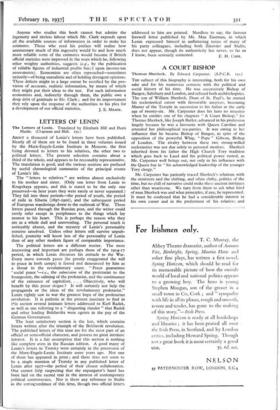LETTERS OF LENIN
The Letters of Lenin. Translated by Elizabeth Hill and Doris Mudie. (Chapman and Hall. 555.) ABOUT a thousand of Lenin's letters have been published. Nearly all of them are to be found in three volumes issued by the Marx-Engels-Lenin Institute in Moscow, the first being devoted to letters to his relatives, the other two to political letters. The present selection contains about a third of the whole, and appears to be reasonably representative. The translation is good, and the various sections are prefaced by useful chronological summaries of the principal events of Lenin's life.
The "letters to relatives" are written almost exclusively to his mother and sister. (Only one letter from Lenin to ICrupskaya appears, and this is stated to be the only one preserved—in later years they were rarely or never separated.) They fall into three periods—the period of youth, the period of exile in Siberia (1897-1900), and the subsequent period of European wanderings down to the outbreak of War. These letters passed through the Russian post, and the writer could rarely refer except in periphrases to the things which lay nearest to his heart. This is perhaps the reason why they are as a whole dull and unrevealing. The personal touch is noticeably absent, and the mystery of Lenin's personality remains unsolved. Unless other letters still survive unpub- lished, posterity will know less of the personality of Lenin than of any other modern figure of comparable importance.
The political letters are a different matter. The most interesting and important are perhaps those of the 1914-17 period, in which Lenin discusses his attitude to the War. Every move towards peace (he greatly exaggerated the will to peace in both camps) is feared and denounced by him as a threat to the revolutionary cause. "Peace guarantees 'social peace '—i.e., the submission of the proletariat to the bourgeoisie, the calming of the proletariat, and the continuance of the existence of capitalism. . . . Objectively, who will benefit by this peace slogan ? It will certainly not help the propaganda or the ideas of the revolutionary proletariat." Lenin rightly saw in war the greatest hope of the proletarian revolution. It is pathetic at the present juncture to find in this section several intimate letters addressed to Karl Radek, as Well as one referring to a "disgusting slander" that Radek and other leading Bolsheviks were agents in the pay of the German Government.
The least satisfactory section is the last, which contains letters written after the triumph of the Bolshevik revolution. The published letters of this time are for the most part of an official or semi-official character, and possess no great intrinsic interest. It is a fair assumption that this section is nothing like complete even in the Russian edition. A good many of Lenin's letters to Trotsky were certainly in the possession of the Marx-Engels-Lenin Institute some years ago. Not one of them has appeared in print ; and there does not seem to be a single mention of Trotsky in any published letter of Lenin after 1917—the period of their closest collaboration. One cannot help suspecting that the expurgator's hand has been laid on the sacred text in the interest of contemporary political controversies. Nor is there any reference to Stalin in the correspondence of this time, though two official letters addressed to him are printed. Needless to say, the famous farewell letter published by Mr. Max Eastman, in which Lenin expressed himself in unflattering terms of many of his party colleagues, including both Zinoviev and Stalin, does not appear, though its authenticity has never, so far as I know, been seriously contested. E. H. CARR.














































 Previous page
Previous page